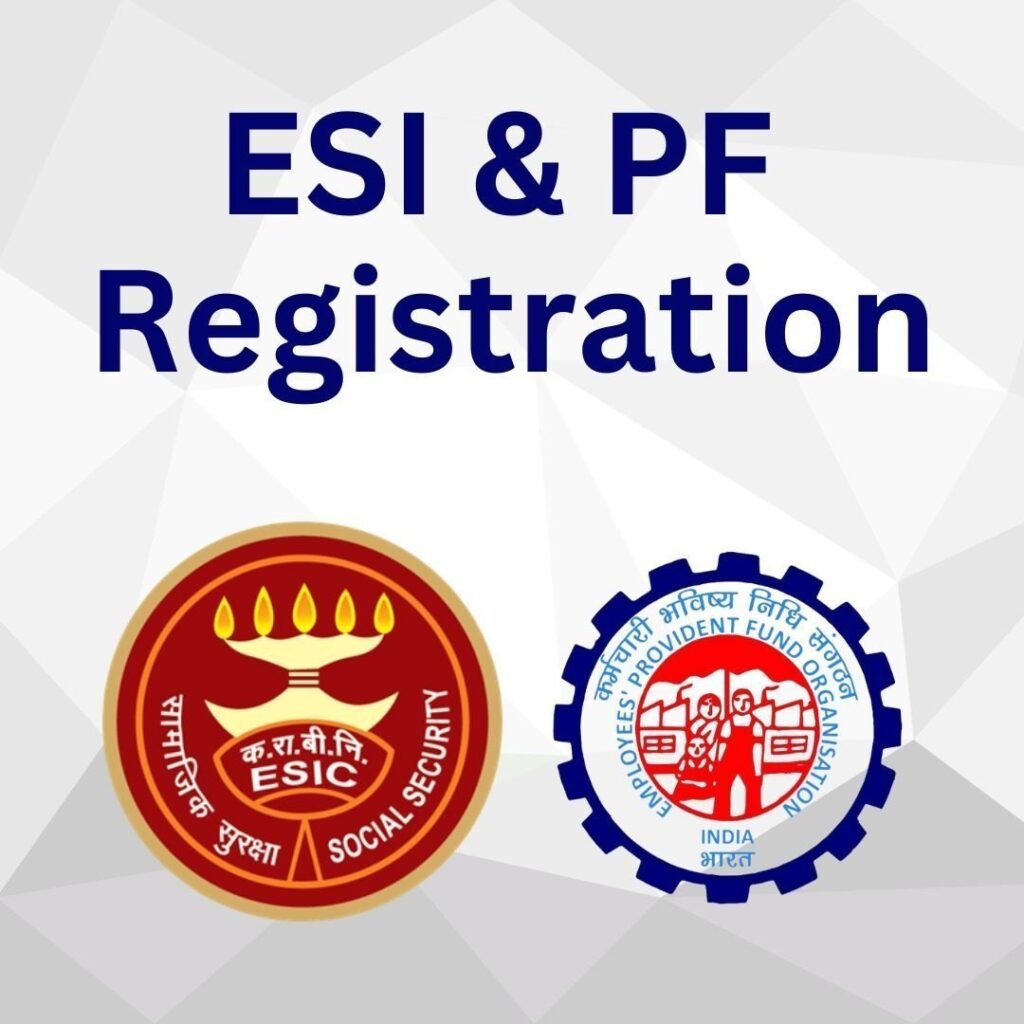- Private Limited Registration
- Public Limited Registration
- LLP Company Registration
- Section 8 Company NGO
- One Person Company Registration
- Nidhi Limited Company Registration
- Proprietorship Firm Registration
- Partnership Firm Registration
- Trademark Registration
- GST Registration & Return
- Trust Registration
- Society Registration
- MSME Registration
- ISO Certificate
- EPF Registration
- ESI Registration
- Digital Signature (DSC)
- FSSAI (Food License)
- Import Export License
- Shop & Establishment Certificate
- Trade License
- Drinking Water Test Report
- 80G & 12A Filing
- Company Compliances
- Fire License
- Copyright Registration
- Patent Registration
- Legal Drafting
- Rice Fortification
- BIS Registration
- Product Testing
- Income Tax Return
- Other Services
Need Any Help?
Speak with a human to filling out a form? Call our helpline number and we will connect you with a team member who can help you.


ESI REGISTRATION IN INDIA
The Employees' State Insurance Act, 1948 was enacted by the legislature as an integrated need based on the social insurance scheme. ESIC stands for Employee State Insurance Corporation which is an autonomous body created by the Ministry of Labor and Employment that governs and regulates the Employee State Insurance in India. To be eligible for ESI Registration in India, you must have more than 10 employees or workers.
Employee State Insurance is a self-financing social security scheme, initiated for the benefits of the Indian workers by providing them with the necessary benefits such as medical facility, monetary facilities and such other benefits from his employer.
This scheme was started for Indian workers. The workers are provided with a huge variety of medical, monetary and other benefits from the employer. Any non-seasonal factory and company having more than 10 employees (in some states it is 20 employees) who have a maximum salary of Rs. 21,000/- has to mandatorily register itself with the ESIC.
Under this scheme, the employer needs to contribute an amount of 3.25% of the total monthly salary payable to the employee whereas the employer needs to contribute only 0.75% of his monthly salary every month of the year. The only exemption to the employee in paying his contribution is whose salary is less than Rs. 176/- per day.
What are Eligible Entities for ESI Registration?
Following entities employing 10 or more employee are liable to get ESI Registration done:-
- Newspaper Establishment
- Private Education Institues
- Establishments engaged in Motor Transportation
- Cinemas
- Restaurants and Hotels
- Shops
What are the Applicability of ESI and Its Coverage?
Above mentioned entities, if employed ten or more employees at any time during the previous year shall mandatory get ESIC Registration. But insurance is deducted for only those employees earning monthly income up to INR 21000 (Basic wages + Dearness Allowance). In a few states, the coverage of ESIC applicability limited to a minimum employee is 20 or more.
ESI scheme provides several benefits to employees covered under ESI with a large network of dispensaries, hospital and medical clinics for providing quick medical care to the insured person. An entity needs to take an ESI registration certificate within 15 days of becoming applicable. However, ESIC regulations are different for different states, and thus, certain rules and provisions vary accordingly.
What are the Benefits of ESI Registration
- Unemployment Benefits
- Medical Benefits
- Maternity Benefits
- Deceased Employee
- Funeral Expenses
- Retirement Benefits
- Benefits for Permanent Disablement
- Sickness Benefits
Sickness Benefits
Sickness benefits are provided to the employee at the rate of 70% of his salary in case such sickness continued for exceeding 91 days in a year, and the same is also certified.
Medical Benefits
Medical benefits are provided to the insured person along with his family members. Full medical care is provided to all persons registered under ESI and their family members – from the day the person enters insurable employment. There is no ceiling on expenditure on the treatment of an Insured Person or his family member. Medical care is also provided to retired and permanently disabled insured persons and their spouses on payment of a token annual premium of Rs.120/-.
Maternity Benefits
Maternity benefits are provided to the women in the form of paid leaves. Maternity benefit for confinement/pregnancy is provided for three months, which is extendable by further one month on medical advice at the rate of full wage subject to contribution for 70 days in the preceding year.
Deceased Employee
90% of the salary of the insured person is given to the family of a deceased employee, in case such death occurred while in employment.
Funeral Expenses
Funeral expenses are provided in case of death of any employee covered under ESIC. An amount of Rs.10, 000/- is payable to the dependents or to the person who performs last rites from day one of entering insurable employment.
Retirement Benefits
Medical care and benefits are provided after retirement or in old age.
Benefits for Permanent Disablement
In case there is any permanent disablement to the insured person, 90% of his salary is provided as a monthly payment in the form of insurance benefit.
Unemployment Benefits
An insured person having insurance for more than three years is provided unemployment benefits which become unemployed. Under the Rajiv Gandhi Shramik Kalyan Yojana, unemployment allowance is payable to an insured Person who become unemployed after being insured three or more years, due to closure of factory/establishment, retrenchment or permanent invalidity. The applicable unemployment allowances provided are:
- Unemployment Allowance equal to 50% of wage for a maximum period of upto one year.
- Medical care for self and family from ESI Hospitals/Dispensaries during the period IP receives unemployment allowance.
- Vocational Training provided for upgrading skills – Expenditure on fee/travelling allowance borne by ESIC.
What are the Documents Required for ESI Registration in India?
Since the procedure for registration is online, no physical Documents are required to be submitted. Following Documents are required during the online filing of ESI application, which are as follows:-
- A registration certificate obtained either under the:-
Factories Act, or
Shops and Establishment Act
- Certificate of Registration in case of Company, and Partnership deed in case of a Partnership,
- Copy of Bank Statement
- Copy of License issued in the Name of Establishment
- Memorandum of Association and Articles of Association of the Company
- A list of all the employees working in the Establishment
- Copy of Electricity Bill
- Copy of Rent/Lease Agreement
- PAN Card of the Business Entity as well as all the Employees working under the entity
- Copy of Board Resolution
- The compensation details of all the employees
- A cancelled cheque of the Bank Account of the Company
- List of Directors of the Company
- List of the Shareholders of the Company
- A register containing the attendance of the employees
Following information/details are also required in addition to the above Document-
If any employee is already registered under ESIC:0
- Employee Insurance Number
- Date of Appointment
If employee is not registered with ESIC
- Name of employee
- Name of employee’s father/husband
- Address
- Date of Birth
- Date of appointment
- Details of nominees (name, address, mobile no, email id, relationship details etc.)
- Bank Account Details (Account number, Branch name, bank name, IFSC code etc.)
- Employer code no.
- Details of the previous employer
- Name of employer
- Employer Insurance no.
- Contact no of employer
- Address of employer
Details of current employer
- Employer code no.
- Employer Insurance number
- Name of employer
- Address of employer
- Contact no of employee
Penalty in Failure to get ESI Registration & Returns
In case of any non-compliance by an employer, such as failure to get ESIC employer registration online or not fulfilling ESI return filing procedure, he shall be liable for a fine of INR 10,000/-.
What are the Post-Registration Compliances Under ESI?
Once the entity is covered under ESIC, it needs to comply with mandatory guidelines as issued by the Act:-
- Maintenance of attendance register
- A complete register of wages for workers
- Inspection book
- Monthly return & challan within 15th of succeeding month
- The register maintained to record any accidents that happened on the premises.
What do You Mean by ESI Monthly Contribution?
The scheme of ESI is contributory in nature. Both employee’s and employer’s contribution is required at a specific rate. Though, rates are amended from time to time. Following is the monthly contribution rate that is contributed mandatorily by both employer and employee:-
- Employee
Employee has to contribute 0.75% of his basic wages to the ESI Fund.
- Employer
Employer has to contribute 3.25% of the basic wage paid to employees.
Employees who earn up to Rs137 of daily average wage are not entitled to be a part of contribution. However, it is the responsibility of the employer to contribute their own shares in respect of these employees.
Returns Filed Every Year After the Registration is Finalized
After the registration ESI Returns have to be filed twice a year. The following Documents are required for the filing of the returns:
- Register of attendance of the employees.
- Form 6 – Register.
- Register of wages.
- Register of any accidents which have happened on the premises of the business.
- Monthly returns and challans.
